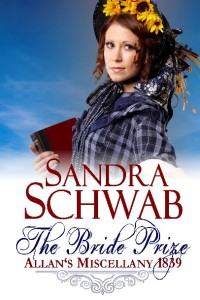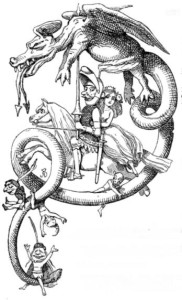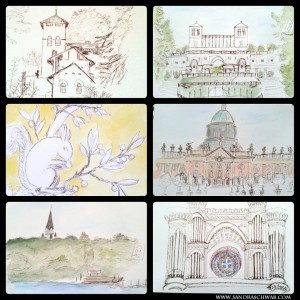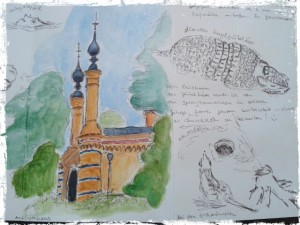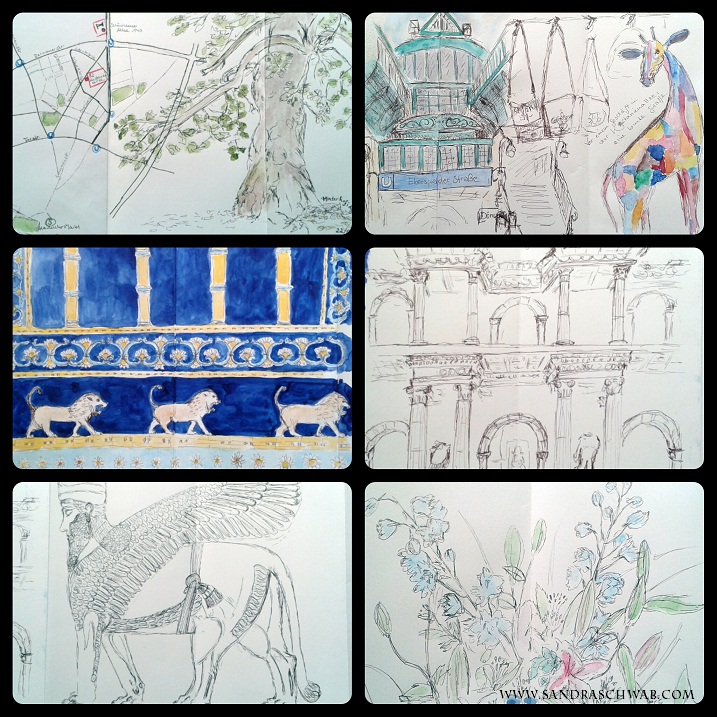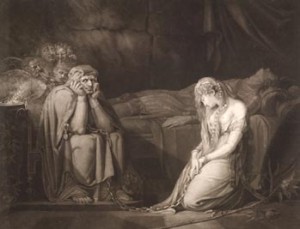Interview with Sandy Schwab — With Book Giveaway!
The Riskies are thrilled to interview Sandy Schwab at the blog today. She helped fill in for Ammanda while she was out, so I’m sure you recall her wonderful posts here. Sandy and I are friends, and you-all know my friends are awesome. After some time away from writing while she was finishing up her PhD, she’s now back with some wonderful new books for us to read. She’ll be giving away a copy of The Bride Prize to one lucky commenter so be sure to check the rules and enter!
Q: Tell us about yourself, Sandy! In 3rd person, please.
Sandra Schwab started writing her first novel when she was seven years old. Thirty-odd years later, telling stories is still her greatest passion, even though by now she has exchanged her pink fountain pen of old for a black computer keyboard. Since the release of her debut novel in 2005, she has enchanted readers worldwide with her unusual historical romances.
She lives in Frankfurt am Main / Germany with a sketchbook, a sewing machine, and an ever-expanding library.
THE BRIDE PRIZE: ALLAN’S MISCELLANY 1839
It’s 1839, and Lord Eglinton’s tournament in Scotland is the most anticipated event of the year: he and some of his noble friends will don medieval armor and joust like knights of old.
Does this mean a revival of true chivalry? Miss Florence Marsh thinks it might.
Or is the tournament mere tomfoolery and the greatest folly of the century? Mr. Robert Beaton thinks it is.
But when Flo and Robbie meet at Eglinton Park, they’ll soon learn that a dash of romance can make the greatest differences look rather small and that true love might find you in the most unlikely place.
Read an Excerpt
The Interview
1. Tell us more about your book.
THE BRIDE PRIZE is the start of a new series set in early Victorian England. In recent years much of my academic research focused on Victorian periodicals, and I thought it would be fun to use this research for my creative work as well. So the heroes in the new series are all artists and writers working for ALLAN’S MISCELLANY, a (fictional) magazine.
In the first story ALLAN is is only a few months old, and the staff consists of a grand total of two people: William MacNeil, editor and writer, and Robert Beaton, writer and chief — well, only — artist. Robbie knows that they need a big break if the magazine is to survive, and so he drags Mac to what must have been one of the strangest (and quirkiest!!!) events of the period: the Eglinton Tournament of 1839.
2. You probably get this question all the time but I’m going to ask it anyway. English is not your first language and you are German and living in Germany. What made you decide to write in English?
I’ve written stories since — well, since forever, and I’ve always wanted to become a published author. When I was 19, I started to seriously pursue publication, and for years and years and years, I tried to find a publisher. Many submissions and many rejections later, I finally realized that I didn’t write the kind of books that a German publisher would buy from a German author.
But I wasn’t quite prepared yet to give up on my dream, so I decided to try switching languages, and English was the only other language I could speak sufficiently well to make this work. This was 14 years ago, and it was the best decision of my life!
3. How is the above an advantage or disadvantage, or is it completely neutral?
Writing in English is a big advantage: it gave me access to this wonderful community of fellow authors. Over the years, I’ve met so many great people and have made so many friends I would have never met if I had continued to write in German. Moreover, I can now reach readers all around the world, and my stories travel to far away places I will never see myself.
Last but not least, love scenes are so much better in English than in German!
4. Why Romance?
When I switched languages, I also switched genres (I had been writing fantasy fiction). At the time, I loved the Outlander series by Diana Gabaldon, and I was dreaming of going to Scotland on a student exchange program (didn’t work out; I went to Galway, Ireland instead). So I started to write this lovely contemporary romance about a young German student (who looked uncannily like myself…) who goes to Scotland (the Highlands, of course!!!) as a teaching assistant and meets this tall, gorgeous (but rather annoying!) vet called Rory MacDonald. There’s much drama, several misunderstandings, a lot of rain, a small owl who can’t fly, and a teddy bear called Hermann Bear. And kilts. Because, SCOTLAND!
I had a lot of fun writing this, yet I also realised that writing contemporary romance presented challenges to my English that I probably wouldn’t be able to fully overcome. Given my love for history, it was only natural that I eventually turned to historicals.
What I love about romance as a genre is its inherent optimism. I’ve always loved historical novels, but I was turned off straight historical fiction by the high number of main characters dying in horrid ways, by exploding wax babies, and ghastly sex scenes (I hit rock bottom with a historical novel that included goat sex scenes — there was more than one goat and more than one such scene — waaaaaargh!!!!! *runs away and hides*).
[Carolyn: Boggles]
When I discovered historical romance, it was a revelation: neither hero nor heroine die at the end of the novel; the sex scenes are fun; there are no exploding wax babies; and most importantly: NO GOAT SEX SCENES!!!! And there’s a happy ending! What’s not to love?
5. Dragons. Who’s your favorite? Pictures if you have one.
I adore the work of Richard Doyle, who worked for the satirical magazine PUNCH in the 1840s, and I love the dragons and dragonslayers that appear in several of his initial letters.
As to literary dragons, I think I might have to go with an old childhood favorite: Fuchur, the luck-dragon from Michael Ende’s NEVERENDING STORY (the book is a million times better than the films, btw!)
6. I love your artwork. Love it. What’s up with all the talent? Links? Pictures? Do you ever take requests?
Awww. Thank you! 🙂 I started to sketch again in early 2012, and took my sketchbook (instead of my camera) on several trips I made that year. The trips to Berlin and to Potsdam in particular were a revelation: So many people would just stop and talk to me while I was sketching.
And it’s not just people: when I visited the Berlin Zoo last year, I was doing a quick drawing of a small armadillo, when I suddenly became aware that somebody was watching me. I looked up and found those two small monkeys staring at me in utter amazement. That was the sweetest thing.
[Carolyn: gets all teary] That is so CUTE!!!
A selection of my drawings can be found on Flickr: https://www.flickr.com/photos/scribblingsandy/
[Carolyn: You should visit her flicker stream. So pretty!!!!!]
As to requests: Nobody has ever made any. 🙂
[Carolyn: Expect to hear from me]
7. If you were forced to reveal who you think is the most handsome man on the planet, who would you name?
Richard Armitage. It’s not just that he is good-looking, but he also appears to be a rather wonderful man. And that voice!!!! *swoons*
8. Favorite shoes?
I’ve got these really cute, red El Naturalista shoes that look fantastic together with jeans.
9. When you come to the US, do you get as confused as Americans about Celsius and Fahrenheit? Is 20 C cold or hot? I literally have no idea.
It’s horrible, isn’t it? I just tend to guess when I’m in the US. (20 C is 68 F, so it’s just warm enough to ditch the cardigan.)
10. What’s next for you?
In the course of the next three months I will release three more novellas in the ALLAN’S MISCELLANY series. I’m having so much fun with this series, with exploring the fate of my fictional magazine, with diving into real period magazines in order to find bits of real news to include in my stories (= excellent excuse for getting more period periodicals!)
Next up is FALLING FOR A SCOUNDREL, in which hard, cynical Jack Fletcher travels to the north of England in order to report on the murder of a gamekeeper. Sophy, the heroine, is the polar opposite of him: she has led a very sheltered, privileged life. She only realizes how very limited this life has been when she meets Jack and he makes her question everything she has ever known.
Where to buy the book!
Plain edition:
Kindle US | Kindle UK | Kobo
B&N will follow soon
Enhanced edition:
Kindle US | Kindle UK
Kobo and B&N will follow soon
Where to find Sandy
Website: www.sandraschwab.com
Facebook: SandraSchwab.Author
Twitter: @scribblingSandy
Giveaway!
Rules: Must be 18 to enter. Void where prohibited. No purchase necessary. Winner chosen at random from among qualifying entries. The Riskies, relatives of the Riskies, Sandy and her relatives are not eligible to enter.
To enter, answer one, two, or all of the following questions, and/or compliment Sandy in the comments no later than 11:59:59 PM on Friday, May 16th, 2014 according to the time at this blog– which is in the EASTERN time zone.
1. What was your reaction to the goat sex book revelation?
2. If you had a dragon, what color would it be?
Go.


